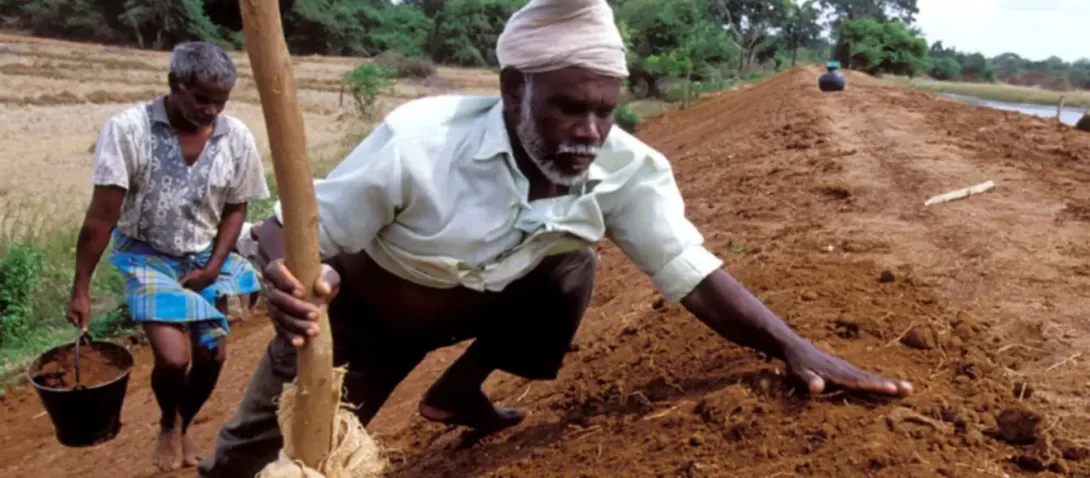
Two men work on a field. Sri Lanka. Photo © Dominic Sansoni / World Bank
Imagine a truckload of fresh mangoes grown by smallholder farmers in Sri Lanka. The fruit is ripe, fragrant, and ready for export. But instead of heading straight to market, it sits at the border waiting for inspections, test results, and paper certifications. Hours turn into days. By the time the mangoes reach their destination, some are spoiled or may no longer meet the strict requirements of the importer. The result? Lost income for farmers, higher prices for consumers, and wasted food.
Wasted food also means wasted water, labor, fuel, and opportunity. Globally, about 14 percent of food is lost between harvest and retail, according to Food and Agriculture Organization estimates. Food rejected annually by importing countries for health or pest concerns alone accounted for about 649,000 tons globally, with a value of nearly US$1.13 billion.
A new World Bank commitment of US$100 million in financing aimed at improving agricultural productivity, market access, and climate resilience is helping Sri Lanka limit food waste by improving its National Quality Infrastructure (NQI). This is the behind-the-scenes system that ensures exported food is safe, traceable, and meets international standards. It includes labs for testing, agencies for certification, and digital systems for tracking products from farm to market.
Agriculture provided a living for 2.1million Sri Lankan households in 2017 and represented more than 26 percent of GDP. Tea, rubber, coconut, and seafood are major exports. There’s also untapped potential in exports of higher-value fruits and vegetables such as mango that can boost rural incomes and create jobs in processing and logistics. However, meeting international standards is tough. Sanitary and phytosanitary (SPS) regulations, meant to protect consumer, agricultural, and environmental health, can become barriers to trade if inspection and certification systems are slow or unreliable.
A Government of Sri Lanka project, the Integrated Rurban Development and Climate Resilience Project (IRDCRP), which is financed by the World Bank, offers a comprehensive solution. It will start by reviewing laboratory systems and developing digital tools to improve efficiency, including traceability systems. The goal is to align testing with the needs of producers and traders; optimize spending on equipment to deliver efficient, high-quality services; and improve coordination between labs to reduce fragmentation and remove redundancies. Digital tools will help streamline the processes required for traders to obtain confirmations that products comply with importer requirements.
The initiative will then modernize Sri Lanka’s labs and testing facilities, improve coordination between public and private agencies, train staff, and upgrade equipment. This is about more than technology; it is about trust. When buyers in Europe or Asia see a Sri Lankan export, they want to know it is safe, sustainable, and high-quality. Strong NQI builds that trust.
Domestic consumers also benefit. As Sri Lanka’s economy grows, studies have shown that consumers are demanding more sustainably grown foods and a wider selection of healthy choices. Efficient NQI ensures that inputs into production, such as seeds and agrochemicals, meet quality standards and that food systems embrace quality from farm to fork.
The program will also digitize the operations of regulatory agencies to speed up certification and make it easier to track compliance. This is especially important as global regulations tighten and become more complex. For example, the European Union’s Deforestation Regulation (EUDR) requires proof that exports like rubber do not come from deforested land. Similarly, foreign buyers and consumers increasingly demand farm-to-fork traceability to ensure the quality and sustainability of products such as cinnamon and tea, two of Sri Lanka’s key exports.
Food imports are also part of the equation. With many households struggling to afford enough to eat, ensuring the accessibility, safety, and quality of imported products is vital. Inefficient NQI adds costs, which are borne by the consumer. In the case of food, cost determines accessibility. Strong NQI helps here too, by setting clear standards, communicating these to producers and processing facilities in a way that they can easily produce high quality food.
Just as Sri Lanka is investing in laboratory upgrades, digital traceability, and regulatory streamlining to unlock the export potential of high-value crops like mangoes, banana, and cinnamon, Nepal’s new treatment facility near Kathmandu is enabling similar gains. By developing systems to certify that exports the pest-free, Nepal is better positioned to access premium markets such as Australia and the United States. These complementary efforts across South Asia underscore how targeted investments in SPS and NQI systems can transform agricultural trade, provide safe and accessible food for families, and boost rural incomes through expanded market access.
In the end, this is about more than just mango exports. It is about building a food system that works for everyone, from farmers and traders to families trying to put dinner on the table. It’s an example of how infrastructure, regulation, and trade policy intersect. It shows how inefficiencies in one part of the supply chain can ripple through the entire economy, hurting livelihoods, wasting resources, and undermining food security. And it highlights the value of smart public investment in systems that may be invisible to consumers but are nevertheless essential.
Engagement on the NQI part of IRDCRP was supported by the FoodSystems2030 Multi-Donor Trust Fund through the South Asian Policy Leadership for Improved Nutrition and Growth (SAPLING).